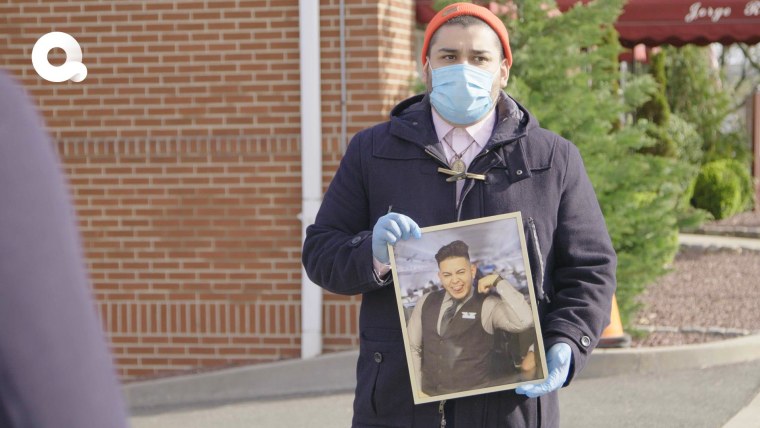Since the coronavirus pandemic first emerged in China, more than a quarter of a million people around the world have died from COVID-19 — many without a family member by their side to help them through their final moments.
With most hospitals banning visits, the infectious nature of the virus has made it impossible for many families to be at the bedside of a loved one who is dying, leaving them instead to grieve from afar.
It has left their loved ones, too, to die with neither the final comfort of a familiar voice nor one last touch of a familiar hand.
But, even as the pandemic continues to grow, some hospitals are reconsidering that policy.
“I was so happy we had the privilege to say goodbye,” Rinat Vita Dishlo told NBC News.
The Tel Aviv Sourasky Medical Center in Israel allowed Dishlo, 48, and her two siblings to see their 74-year-old mother before she died from COVID-19 on April 22.
Wearing full protection, Dishlo was able to not only see her mother, but stroke her head and hair as she lay in her bed, slipping in and out of a coma.
“I talked to her and she opened her eyes,” Dishlo said. “I reached out my hand to her and she squeezed it back.”
The hospital was the first in Israel to start allowing families to see people who are dying from the coronavirus.
Hospital spokesman Avi Shushan said hospital officials had heard “horror stories” from around the world about people dying alone. But with Israel managing to keep the outbreak at bay, with 245 deaths, he said the hospital recognized it could safely accommodate families wanting to be there till the end.
Let our news meet your inbox. The news and stories that matters, delivered weekday mornings.
“We can’t change the fact that people will die from this virus, but at least we can give these moments of compassion to family members and their loved ones,” Shushan added.
In Spain, one of the hardest-hit European nations, a makeshift hospital at Madrid’s IFEMA conference center, built for treating people with the coronavirus, was also one of the first to allow end-of-life visits. In March, it set aside eight rooms to give families privacy.
Clinical psychologist Laura Bezos Saldaña and her team were tasked with preparing families for their final goodbyes, so they could fully express their emotions and leave nothing unsaid.
From a psychological standpoint, Saldaña said it also allowed families to start their grieving process properly.
She said the gratitude from the families was overwhelming, even for a seasoned professional. “Sometimes, I would shed a tear because you empathize a lot with their pain,” she said.
As countries across the globe respond to the pandemic, many have adopted different approaches to end-of-life visits.
In Italy, which had the second-deadliest outbreak in Europe, hospitals don’t allow any visits for people with COVID-19, even in end-of-life cases, the country’s health ministry told NBC News.
But in the U.K. — which now has the highest death toll in Europe, with more than 30,000 people killed — the country’s health minister, Matt Hancock, said last month families of people with COVID-19 will be given the “right to say goodbye.” This came after distressing reports of a 13-year-old British boy dying alone, without his family at his side.
“Wanting to be with someone you love at the end of their life is one of the deepest human instincts,” Hancock said. “It’s a moment that will be with you forever.”
In South Korea, which managed to contain the virus with robust testing and aggressive contact tracing, one private hospital in Daegu, an early epicenter of the outbreak, set up a so-called hospice room where patients and their families can say goodbye, South Korea’s deputy health minister Kim Gang-lip told NBC News.
It’s not the norm, but rather “an exception,” Kim admitted.
In the U.S., many families of people with COVID-19 have told NBC News they could not visit their loved ones before they died. Several have had to rely on technology to say their final goodbyes.
For Gerry Brostek and his siblings, the last chance to see their 87-year-old father alive came on a FaceTime call while he was being treated at North Shore University Hospital in Manhasset, New York.
Brostek, 56, said the hospital had a zero-visitation policy when his father died, on March 25.
“We were trying to keep a stiff upper lip and put a smile on, but we knew it was the last time we’d talk with Dad,” he said about the call. “It was very surreal, but we all figured this was better than nothing. How do you say goodbye to your father on a FaceTime call?”
The Centers for Disease Control and Prevention said in an email Monday that family visitation policies involving people with the coronavirus in U.S. hospitals are left to the discretion of hospital administrators.
The American Hospital Association said it was not aware of any U.S. hospitals allowing family members to visit people with COVID-19 who are dying.
“The extraordinary reality of COVID-19 has forced many hospitals and health systems to take extraordinary measures to keep patients and communities safe,” said Nancy Foster, AHA’s vice president for quality and patient safety policy.
“We do not take lightly the sacrifices we are asking individuals and their loved ones to make; we would not do so unless it was absolutely necessary.”












